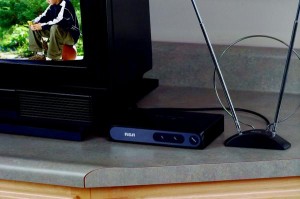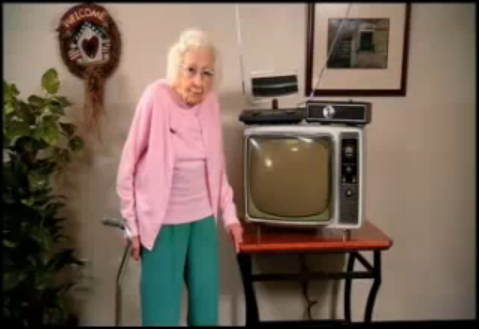In honor of today’s shut-off of analog over-the-air TV, we’re posting a link to this humorous video showing the difficulties of the digital transition.
Delay of Analog TV Shut-off
 Last night the Senate passed a bill to delay the shut-off of over-the-air analog TV from February 17 to June 12, 2009. The Obama administration had urged the delay, saying that many consumers are not ready.
Last night the Senate passed a bill to delay the shut-off of over-the-air analog TV from February 17 to June 12, 2009. The Obama administration had urged the delay, saying that many consumers are not ready.
Nielsena said last week that more than 6.5 million U.S. households are not prepared and could see their television sets go dark next month.
The House might not immediately pass the Senate’s version of the bill, which does not specify how the costs of a delay would be covered. The House could add its own provisions, which would require further Senate action. It could also waive budget rules and seek funds in the stimulus package. Still, it looks like the House will pass some bill that will delay the shut-off until June 12.
See our previous post on Digital TV Transition to see if you might be affected by this transition. Or go to the government’s National Telecommunications and Information Administration (NTIA) site for more info and your free $40 voucher for a digital TV converter.
UPDATE: Despite the unanimous vote by the US Senate to delay the Feb. 17 deadline to transition to digital television, the changeover will proceed as planned after a vote Wednesday by the House of Representatives.
It is unclear if this permanently kills the delay. With less than three weeks untill the planned analog shut-off, the window is almost over for a delay. The television stations need time to make preparations so unless something else happens this week, I now expect the Feb 17 transition to happen.
UPDATE 2: Today (February 4, 2009) the House of Representatives voted again and this time passed the delay of the analog shut-off until June 12, 2009. Now President Obama will sign the delay into law.
Delay to Digital TV Transition?
The incoming Obama team has written Congress asking for a delay of the planned February 17th turn off of analog over-the-air TV signals. While most people won’t notice this eventual transition, there are some hurdles.
Most People Aren’t Affected
The loss of analog over-the-air signals will not affect most people who use one of 1) cable, 2) Satellite (Dish or DirecTV), 3) digital over-the-air (still using an antenna), or 4) fiber (FIOS TV service). Most people in the D.C. area will not be affected. TVs made in the last couple of years should have digital tuners, known as ATSC tuners.
Expected Problems
 In my experience setting up home theaters and TVs in the DC metro area, I have found some problems that will likely come with this transition:
In my experience setting up home theaters and TVs in the DC metro area, I have found some problems that will likely come with this transition:
- Analog signals travel better. While the term “digital” seems like it should mean “better”, it has a big downside. Analog tuners deal with missing data (the result of a poor signal) much better. Digital signals that do not have enough data quickly turn to jaggies and then a blank screen. This is sometimes referred to as a digital cliff effect. The same concept applies to HD Radio. Digital therefore does not travel as far as analog and it does not work as well through walls. Even in Arlington, Virginia, not far from the TV towers, a good signal usually requires an antenna to be placed in a window, on the roof, or in a high attic. People farther away will have more problems. Residents in rural Virginia might now be too far to get any over-the-air signal.
- Old homes in D.C., Virginia, and Maryland can not be easily wired for cable. The house walls might be made of concrete, brick, or stone that is difficult to wire through. This has caused some local residents to opt for analog over-the-air TV instead of cable or FIOS. Other people have decided to only wire their living room, and still use analog over-the-air in other rooms. The old construction can also cause problems running an antenna to a window, roof, or attic.
 Possible Delay
Possible Delay
The Obama team has requested a delay because the National Telecommunications and Information Administration (NTIA), which is to provide education and $40 vouchers for people to buy digital TV converter boxes, ran out of money on January 4. There is also concern that many people, especially poorer and more rural areas, have not yet heard that they will need a converter and a larger antenna.
Web Resources
To find out what kind of signal you can expect and what kind of antenna you need to get digital programs, see AntennaWeb site and click Choose an antenna. Another useful site is HDTV Hub, which lists many users experiences for their particular locations. You can find out through these sites what kind of over-the-air HDTV experience that you can expect.
